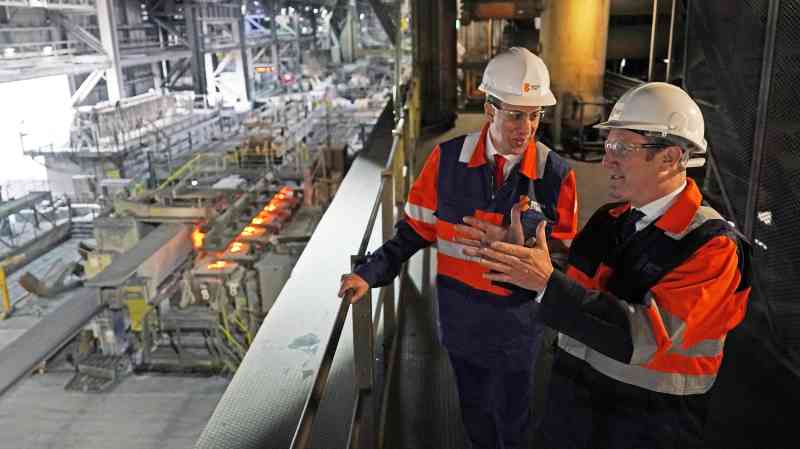British Steel closes in on £600m state rescue deal
The government is closing in on a bailout of British Steel in which the taxpayer would inject £600 million into the group.
Labour this weekend signalled a new intent to break an impasse in talks with British Steel’s Chinese owner, Jingye, that has clouded the future of its vast works in Scunthorpe for more than four years.Now, Jingye has helped hone in on a compromise by committing to bankroll the hugely loss-making operations until the second half of 2025 at least.
British Steel is one of only two manufacturers of strategically important “virgin steel” in the UK, alongside Tata Steel at Port Talbot in Wales. Tata is in more advanced talks of its own with the government over a similar bailout.
Jingye acquired British Steel in March 2020 after it collapsed into bankruptcy a year earlier. The company operates two blast furnaces and employs 4,000 people at its Lincolnshire steel plant.
Bosses want to switch from the company’s loss-making blast furnaces to cleaner electric arc furnace (EAF) production, at a cost of £1.25 billion. Doing so would reduce carbon emissions by 75 per cent, British Steel has claimed.
But Jingye is not prepared to make the switch without significant public subsidy and is in talks to gain access to £600 million of taxpayer aid.
Unions warn that even if the deal is approved about 2,000 jobs would be lost, because EAF is far less labour-intensive than traditional production methods.
Some of the Scunthorpe production would also be moved to British Steel’s Teesside plant, where a new EAF facility is scheduled to be built.
Talks dragged on under successive Conservative administrations, with officials wary of the commitment of British Steel’s Chinese backer and concerned about a slew of red flags raised by the company’s auditors.
However, the change of government has injected new impetus into negotiations, with a number of options now under consideration, according to sources close to discussions. These are thought to include plans to invest in carbon capture and storage and to continue running blast furnaces until the new EAFs are in operation.
“We’re working in partnership with trade unions and business, including British Steel, to secure a green steel transition that’s right for the workforce and safeguards the future of the industry in Britain,” a government spokesman said.
Meanwhile, recently filed accounts will allay some of the fears within Whitehall over British Steel’s finances. The accounts show that Jingye injected £100 million of equity into the business last October and confirmed to the British Steel board that it “will provide financial support, should it be required” until at least July 2025. British Steel has received over £200 million in loans from Jingye.
The delayed accounts related to the year to December 2021, but were signed off on July 18, 2024 — after Labour came to power.
Commentary in the financial statements said the new government “understands” the cost pressures facing British Steel. “Formal funding” talks with Sir Keir Starmer’s administration are taking place, the company added.
A government spokesman said: “Decarbonisation does not mean deindustrialisation, which is why we’ve committed to £2.5 billion of investment to rebuild the steel industry and support communities for generations to come.”
Sources close to the talks said that a deal to rescue British Steel is unlikely to pre-date a similar bailout of Tata Steel.
British Steel declined to comment.
Tata’s Indian owners had struck an agreement with Rishi Sunak’s government to close its two blast furnaces in Port Talbot and switch to EAF production, but the deal was not signed before Sunak called Britain to the polls in early July.
Business secretary Jonathan Reynolds convinced union leaders to drop strikes at Port Talbot days into taking up the role. Industrial action threatened to poleaxe the deal agreed under the Conservatives that would have led to the longest-serving south Wales steelworkers receiving up to £100,000 each in redundancy.
Reynolds risks coming into further conflict with unions over Labour’s plans for the steel sector. Union leaders say taxpayer aid should only be provided on the proviso that blast furnace production continues.
British Steel and Tata argue that blast furnace production in the UK is loss-making and therefore uneconomic. Continuing blast furnace production in the medium to long-term would also be at odds with Labour’s green pledges. The Port Talbot works, for instance, accounts for roughly 20 per cent of all of Wales’s carbon emissions.




Post Comment